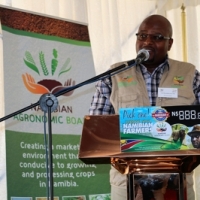
NAB board increases the Horticulture market share promotion (MSP) from 44 to 47%
The Namibian Agronomic Board announced the increment of the Horticulture Market Share Promotion (MSP) at a Press Conference held in Windhoek last week.
The MSP policy was established by the NAB in 2005, as a tool to facilitate the increased production of horticulture products in Namibia, with the aim of achieving food self-sufficiency. In terms of the MSP, importers of fresh horticulture products are required to source a minimum percentage of their products from Namibian producers, prior to qualifying for an import permit in a given quarter.
Speaking at the press conference, the NAB Chairman, Mr. Michael Iyambo said that the decision to increase the MSP from the current 44% to 47% was taken by the NAB Board at a meeting held on the 03 August 2018. The 3% increase in horticulture MSP will be implemented effective 1 December 2018.
“Therefore, any importer of fresh produce into Namibia will buy 47 % first from local producers before they can be issued with a new permit to import the remaining 53 %. Our future MSP target is to achieve an average of 60 % of horticultural total consumption in the country”, he concluded.
The initial MSP started at 5% in 2005 but increased to 44% during the 2015/16 financial year. Through the MSP, the reduction in marketing risks stimulated import substitution, whereby existing producers increased the area under production, new producers started planting for the formal market and subsequently the Green schemes started increasing horticulture production.
Also speaking during the press conference, the NAB Chief Executive Officer, Dr Fidelis Mwazi encouraged local producers to increase their production in order to meet this demand from the retailers. The 3% increase in horticulture MSP directly translate in monetary terms to about N$20 million per annum worth of fresh produce to be supplied by local producers to the formal market.
The Namibian Agronomic Board, through AMTA as its implementing agent will closely monitor the production and supply situation to ensure quality and consistent supply of fresh produce to the Namibian consumer.
